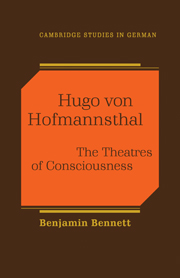Book contents
- Frontmatter
- Contents
- Preface
- Acknowledgments
- List of Abbreviations
- Part I Principles of lyric and drama
- 1 Kleist's puppets
- 2 Language as poetry
- 3 The smallest world theater
- 4 Death and the fools
- 5 Idea, reality and play-acting in Der Tor und der Tod
- 6 Theatrical philosophy: from Der Tor und der Tod to Theater in Versen
- Part II Language and society
- Part III Culture and collapse
- Conclusion
- Notes
- Index of works
- General index
1 - Kleist's puppets
Published online by Cambridge University Press: 04 August 2010
- Frontmatter
- Contents
- Preface
- Acknowledgments
- List of Abbreviations
- Part I Principles of lyric and drama
- 1 Kleist's puppets
- 2 Language as poetry
- 3 The smallest world theater
- 4 Death and the fools
- 5 Idea, reality and play-acting in Der Tor und der Tod
- 6 Theatrical philosophy: from Der Tor und der Tod to Theater in Versen
- Part II Language and society
- Part III Culture and collapse
- Conclusion
- Notes
- Index of works
- General index
Summary
By “principles” of lyric and drama I mean the generic principles that emerge gradually from various texts as young Hofmannsthal struggles to establish in language a firm relation to the private and problematic sphere of self-consciousness. My first point is that Hofmannsthal orients himself in this matter largely with respect to the thought of Heinrich von Kleist, which he finds unacceptable. My focus here is upon Hofmannsthal; I do not claim to present a complete or adequate interpretation of Kleist's puppet-theater speculations.
As far as I know, it cannot be demonstrated that Hofmannsthal was aware of Kleist's essay “Über das Marionettentheater” before August 1895; but given the extent of his reading in general, plus a few apparent echoes in his writing, conclusive proof is probably not necessary. It is reasonably clear that by 1895 he not only had read the puppet-theater essay but had developed a strong critical attitude toward it. We read among his notes:
leben oder sich ausleben nur im Kampf mit den Widerstrebenden Mächten. So lehrt mich mein Pferd den Werth des Vermögens, der Unabhängigkeit. Sehnsucht, Hass, Denrüthigung … sind die Einstellungen des seelischen Augapfels zum Erkennen der eigenen Lage im universellen Coordinatensystem und des Verhältnisses zu den andern Geschöpfen. Vorher geht man in Gedanken leichtfertig mit den Wesen um wie mit Marionetten. (scheinhaftes Leben.)
(W29 42; A 127)to live, or to live oneself out completely, [is possible] only in the struggle with Opposing Powers.
- Type
- Chapter
- Information
- Hugo von HofmannsthalThe Theaters of Consciousness, pp. 3 - 18Publisher: Cambridge University PressPrint publication year: 1988



